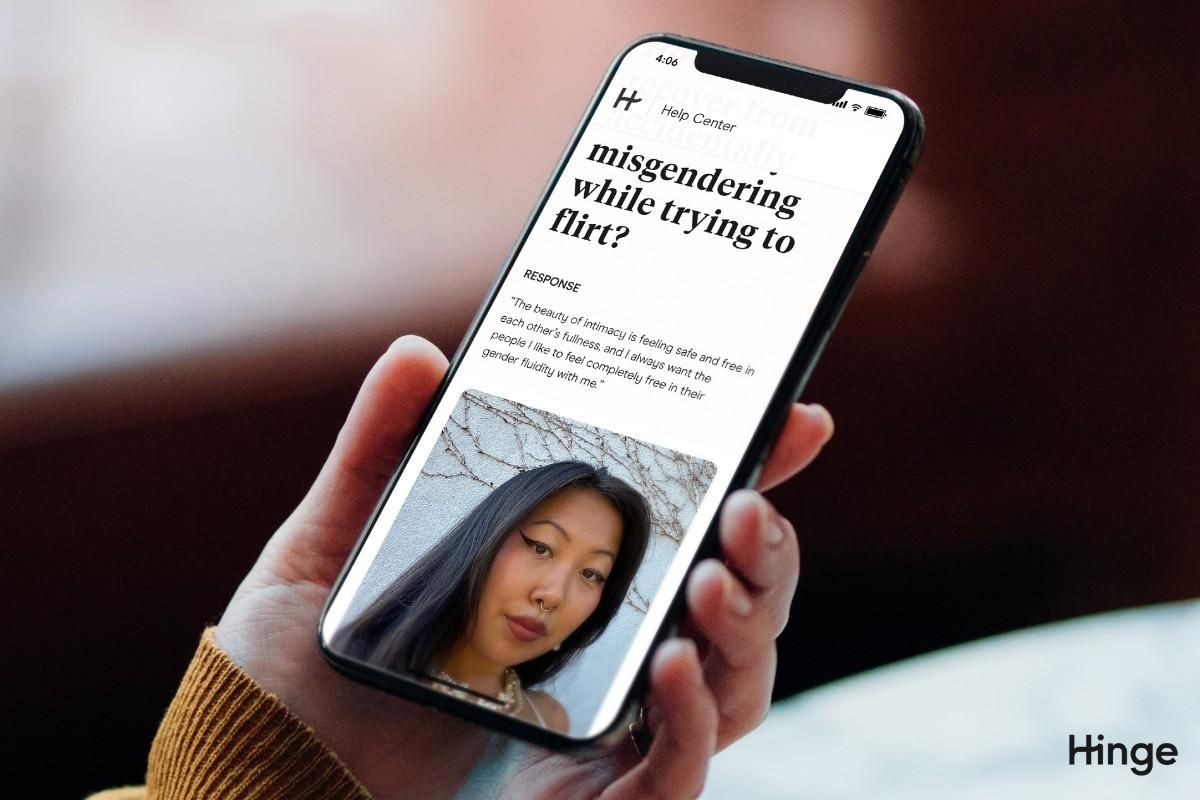Hinge Launches In-App Guide To Answer Queer Daters' Questions
Hinge In-App Guide
Unlike their straight or cis counterparts, LGBTQIA+ folks have fewer resources to turn to when it comes to navigating their identity and dating—putting queer daters at a disadvantage in building healthy and meaningful connections. In fact, 80% of LGBTQIA+ users on Hinge struggle to find resources that help them date. A twist on a traditional Q&A, Hinge’s NFAQ platform is a collection of questions queer singles need answered the most—questions of sexuality, self-discovery, and connection—all through the lens of dating and relationships.
Starting on Tuesday, August 9, 2022, NFAQ will be available globally in Hinge’s app, so that users can tap into this resource at any point on their dating journey. Additionally, the platform will be available for anyone to access at hinge.nfaq.co. Daters can also submit their own questions at any time for future consideration as Hinge continues the conversation with the LGBTQIA+ community.
Hinge is tapping influential and credible perspectives from across the LGBTQIA+ community to share their lived experiences on important topics not talked about enough on social media or in mainstream media.
- Vacancy Project founder and hair stylist Masami Hosono (they/them) is addressing the NFAQ topic: “I matched with my ex's ex, but we're still friends. How should I approach setting up a date?”
- Licensed social worker and therapist Shahem McLaurin (they/them) is addressing the NFAQ topic: “I’m demisexual. What’s the best way to set expectations around waiting to get sexual?”
- Former magazine editor Phillip Picardi (he/him) is addressing the NFAQ topic, “How do I talk about the importance of my faith with someone who might not be on the same page?”
- Writer, actor, and filmmaker Tara Raani (they/she/he) is addressing the NFAQ topic: “How can I start dating if I'm not ready to come out?”
- Emergency Medicine Physician Dr. Darien Sutton (he/him) is addressing the NFAQ topic: “How do I express my boundaries around substance use without sounding judgemental?”
- Be Not Afraid of Love author and artist Mimi Zhu (they/them) is addressing the NFAQ topic: “How can I feel better affirmed in my gender in the early stages of dating?

Hinge In-App NFAQ section
“For LGBTQIA+ people, our experiences are so unique that the typical answers to dating questions don't meet our needs. NFAQ is a transformative resource that will support queer daters with creating and maintaining authentic relationships,” says Hinge’s Love and Connection Expert Moe Ari Brown, LMFT. “NFAQ is making the necessary space to not only answer LGBTQIA+ folks’ burning questions but to also cultivate an atmosphere of celebration and inclusivity on Hinge and beyond our app.”
“Hinge is committed to helping everyone find love—yet the support daters need along the way isn’t always available. With the launch of NFAQ, we are able to promote meaningful conversations about the intricacies of LGBTQIA+ dating and empower queer daters with guidance from credible voices that will ultimately help them find someone special,” says Jackie Jantos, Hinge’s Chief Marketing Officer.
Ongoing Commitment
With the launch of NFAQ, Hinge is also investing resources in local LGBTQIA+ community centers across the United States as they work tirelessly to create supportive and affirming spaces. Included in the company’s efforts are supporting the Brooklyn Pride Center with tackling queer isolation, the Trans Wellness Center with providing comprehensive resources and services under one roof for transgender and non-binary people in Los Angeles, and the Detroit-based community center, Affirmations, with their focus on providing behavioral counseling and health.
Hinge continues to introduce new efforts supporting LGBTQIA+ daters on their journeys of self-expression and finding connections. In May, Hinge launched Mental Health Advocates of Tomorrow to increase therapy access for BIPOC and LGBTQIA+ daters. Earlier this year, with the support of GLAAD, Hinge released new Prompts to help LGBTQIA+ users better connect based on similarities, interests, and compatibility. Additionally, the app’s algorithm has a gender selection that includes “non-binary,” and profiles offer a range of representation choices singles can add to their profile to better express themselves. This includes pronouns, sexual orientation options, more than 50 gender options, and the ability to write in your gender.
About Hinge
Hinge is the dating app designed to be deleted. In today’s digital world, singles are so focused on sending likes and looking through profiles that they’re not actually building meaningful connections and finding relationships. Hinge is on a mission to change that by designing the most effective, 3D app experience. On Hinge, there are no rules, timers, or games. Instead, you’ll have unique conversations over the text, photos, and audio you’ve shared on your profile. And it’s resonating with daters. In 2021, Hinge saw a 36% increase in dates globally in comparison to 2020. Hinge was acquired by Match Group(NASDAQ:MTCH) in 2018



 Number 1 GIF by PragerU
Number 1 GIF by PragerU



